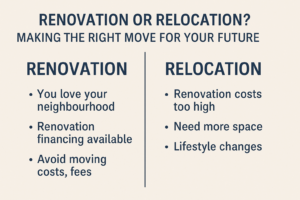
Introduction:
Homeowners often reach a point where their current space no longer suits their needs. Whether it’s a growing family, aging property, or simply a desire for something new, the big question becomes: Should you renovate or relocate? In today’s high-rate environment, making the right decision could have a major impact on your financial health.
The Case for Renovating:
Renovations can help you tailor your home to your evolving needs while potentially boosting its value.
Why Renovate?
-
You love your neighbourhood, school district, or commute.
-
You’ve built significant equity and want to reinvest in your current property.
-
Renovation financing may be easier than qualifying for a new mortgage at today’s rates.
Financial Considerations:
-
A refinance can provide access to equity for renovation funds.
-
Many lenders offer purchase plus improvements or refinance plus improvements options.
-
Renovations typically do not incur land transfer tax or realtor fees.
The Case for Relocating:
Sometimes starting fresh makes more sense—especially if your current home can’t be modified to suit your needs.
Why Relocate?
-
Renovation costs exceed the value they’ll add.
-
You need more space or a completely different layout.
-
You’re downsizing or changing lifestyle.
Financial Considerations:
-
You may be able to port your mortgage if rates and terms make sense.
-
Consider moving costs, legal fees, land transfer tax, and the higher rates associated with new mortgage debt today.
What to Watch:
-
Interest Rate Risk: Today’s average refinance rate is around 4.40% uninsured (as of time of publishing), meaning your new payments may be higher—even if you downsize.
-
Appraisal & Equity: Renovation lending is usually based on as-is and as-improved value. Ensure your plans align with what an appraiser will support.
-
ROI on Renovations: Kitchens and bathrooms typically yield the highest return, while pools or luxury upgrades may not recoup their cost.
Final Thoughts:
Every homeowner’s situation is unique. A refinance for renovations could be the smarter move for some—while others might benefit from a strategic relocation. Understanding both options helps you make the right financial call, not just the emotional one.